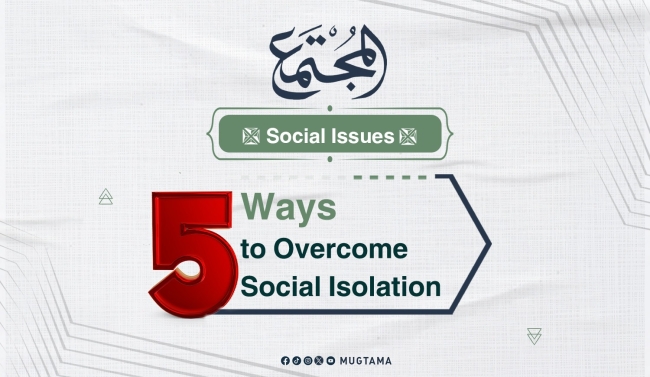Social interaction is gradually declining, even among family members, due to the overwhelming presence of communication technologies, the increasing capabilities of smartphones, the dominance of materialistic lifestyles, the weakening of kinship and friendship ties, and decreasing trust in others. Additional factors, varying from one society to another, also contribute to this decline, including political, security, and economic conditions.
In recent decades, there has been a noticeable drop in the number of people who reported having a close confidant in their lives. The time people spend with family, friends, colleagues, and neighbors has also decreased—from 15 hours to only 10 hours per week, according to data from the U.S. Census Bureau.
A medical study shows that individuals suffering from social isolation are at a higher risk of illness, particularly heart diseases and strokes. Their ability to perform daily tasks diminishes, and their efficiency at work and home declines as well, with these negative feelings impacting their roles as employees, spouses, and parents.
American writer Jessica Stillman notes that the lack of human interaction has a significant impact on energy levels, much like the lack of food, highlighting the importance of the emotional and psychological nourishment provided by social connection.
Here’s a five-step roadmap to help you overcome social isolation:
1. Choose good friends
The Prophet Muhammad (peace be upon him) encouraged choosing friends carefully, comparing a good companion to a perfume seller. He said: "The example of a good pious companion and an evil one is that of a person carrying musk and another blowing a pair of bellows. The one who is carrying musk will either give you some perfume as a present, or you will buy some from him, or you will get a good smell from him, but the one who is blowing a pair of bellows will either burn your clothes or you will get a bad smell from him." (Sahih al-Bukhari)
The hadith emphasizes the importance of a good friend, who is like a pleasant fragrance that brings happiness and helps dispel feelings of frustration, depression, and isolation.
2. Uphold ties of kinship
Maintaining kinship ties is a sign of faith. The Prophet Muhammad (peace be upon him) said: "He who believes in Allah and the Last Day, let him be hospitable to his guest; and he who believes in Allah and the Last Day, let him maintain good the ties of blood relationship; and he who believes in Allah and the Last Day, must speak good or remain silent." (Sahih al-Bukhari)
He also said: "Whoever would like his lifespan to be extended, his provision to be increased and a bad death to be warded off from him, let him fear Allah and uphold his ties of kinship." (Al-Bazzar and Al-Hakim)
These hadiths highlight the benefits of kinship, such as improved health, longer life, increased blessings in provision, and protection from misfortune. Those who maintain kinship ties enjoy better mental health due to their positive social relationships and openness to others, which often results in greater social acceptance and love.
3. Engage in physical activity
A medical study revealed that individuals experiencing social isolation rarely exercise and often suffer from poor sleep. This increases their risk of stroke by 32% and heart disease by 29%. There is also a link between isolation and a higher risk of Alzheimer's disease. In fact, the impact of loneliness and isolation is equivalent to smoking 15 cigarettes a day.
Therefore, it is recommended to exercise regularly, pursue enjoyable hobbies, take walks in the fresh air, cycle, swim, or play soccer—activities that can help break the cycle of isolation and create new opportunities for social interaction.
4. Limit time on social media
Some compare social media to "intersections" rather than "connections," as it reduces friendships and family ties to impersonal reactions such as likes and shares, without genuine interaction. This is especially true when offering condolences, which is often limited to a Facebook message without visiting the deceased's family.
Avoid excessive time in the virtual world and revive traditional social interactions, such as visits and phone calls. Social bonds are not measured by the number of followers on your page or channel but by the quality of your communication and interaction with friends, colleagues, and acquaintances.
5. Help others and engage in volunteer work
Offer assistance to others, participate in charity work, distribute alms and zakat, bring joy to a fellow Muslim's heart, or help someone in need. Offer free medical or educational services, work to reconcile disputes, and engage in other social activities that have a positive impact and bring great reward.
The Prophet Muhammad (peace be upon him) said: "He who removes from a believer one of his difficulties of this world, Allah will remove one of his troubles on the Day of Resurrection." (Sahih Muslim)
He also said: "Whoever eases the burden of a debtor, Allah will ease his burden in this world and in the Hereafter."
Such actions not only bring joy to others but also free you from feelings of frustration and isolation.
-------------------------------------------------------------


